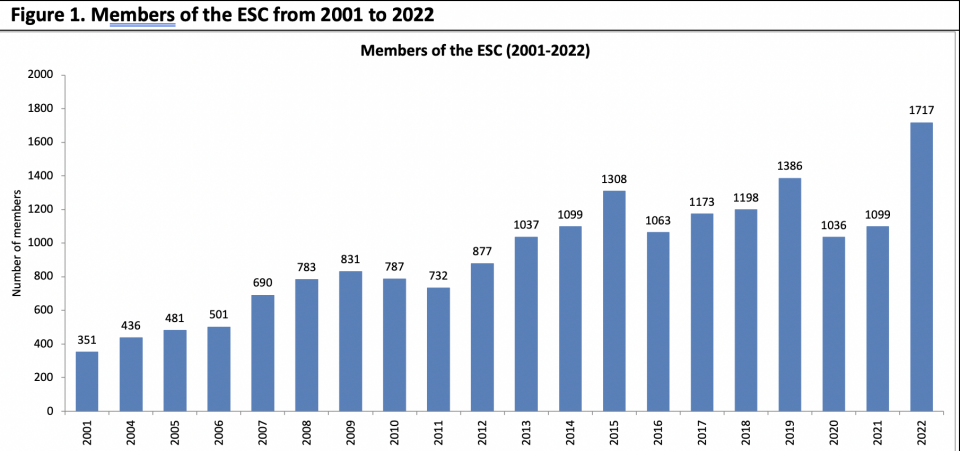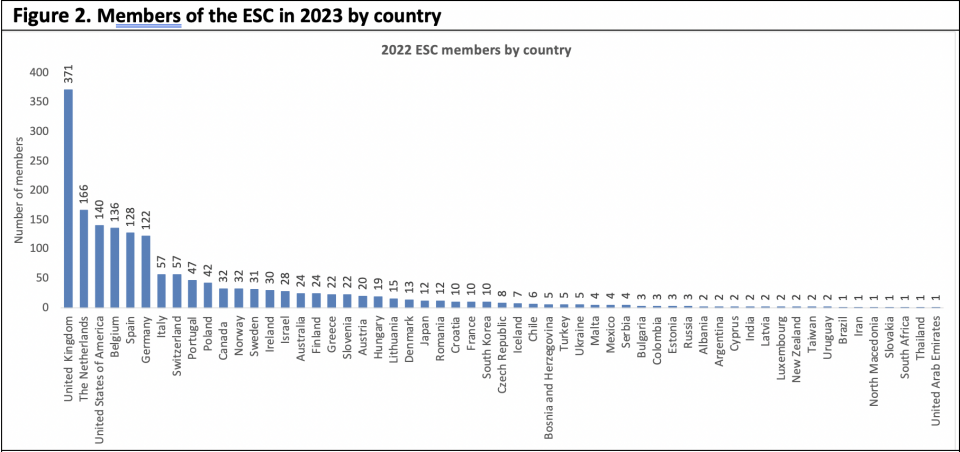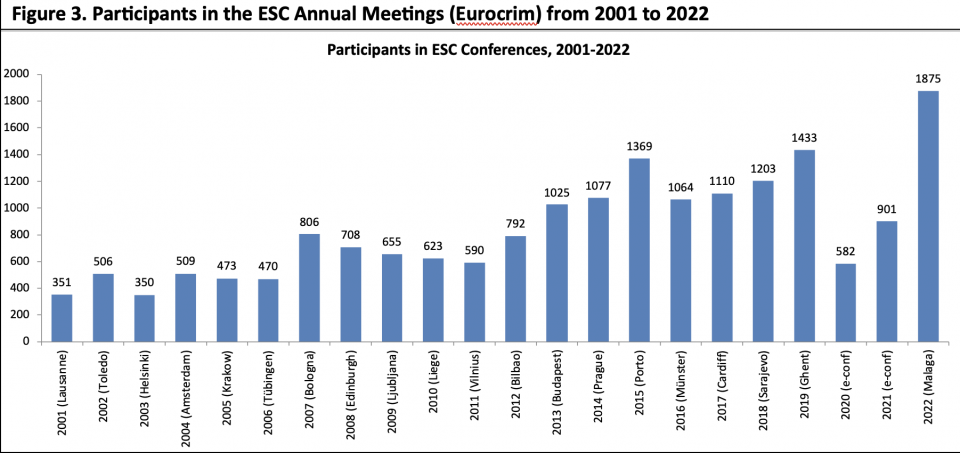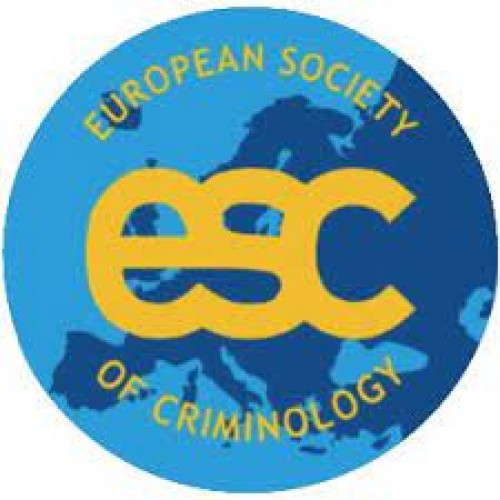ESC Executive Secretariat Annual Report 2023
In brief
The 23rd Annual European Society of Criminology (ESC) meeting, held in Florence, Italy, in September 2023, marked a year of unprecedented growth and success for the society. Key highlights include:
- Record-breaking membership: ESC membership reached an all-time high of 2,175 members, a 26.7% increase from the previous year.
- Global representation: Members from 59 countries across five continents, with 79.5% from European countries and 20.6% from non-European countries.
- Exceptional conference attendance: Eurocrim 2023 in Florence drew 2,484 participants, a 32.5% increase from the previous year's conference in Malaga.
- Awards recognition: Five prestigious awards were presented, including the ESC European Criminology Award to Professor Uberto Gatti, and two recipients for the EJC Best Article of the Year 2022 Award.
- Growth of student membership: Student members accounted for 24% of the total membership, highlighting the ESC's commitment to nurturing the next generation of criminologists.
- New initiatives: Plans for the first ESC Summer School in 2024 were announced, to be held at the University of Lausanne.
- Ongoing projects: The European Criminology Oral History Project (ECOH) conducted several interviews with prominent criminologists.
- Elections: Michele Burman was elected as President-Elect, Anna Di Ronco as an At-large Board member, and Uberto Gatti as Auditor.
This year's achievements demonstrate the ESC's resilience post-pandemic, its expanding global influence and its continued commitment to advancing criminological research and dialogue across Europe and beyond.
Trends in ESC membership from 2001 to 2023
The year 2023 marked a significant milestone in the history of the European Society of Criminology (ESC), with membership reaching an unprecedented high of 2,175 members (see Figure 1). This represents a remarkable increase of 26.7% from the previous year’s 1,717 members, which was itself a record at the time. The substantial growth in 2023 further solidifies the upward trajectory that the ESC has maintained since its inception in 2001, despite occasional fluctuations.

The resilience and appeal of the ESC are evident in its membership trends over the past few years. Following a dip in membership during the COVID-19 pandemic years of 2020 (1,036 members) and 2021 (1,099 members), the Society has not only rebounded but has surpassed all previous records. This growth trajectory demonstrates the ESC’s ability to adapt to challenging circumstances and its continued relevance in the field of criminology.
It is noteworthy that the proportion of student members has remained relatively stable, accounting for 24% of the total membership in 2023. This consistency in student representation (516 out of 2,175 members) underscores the ESC’s ongoing commitment to nurturing the next generation of criminologists and maintaining a balanced demographic within its ranks.
Geographical distribution of ESC members in 2023
The year 2023 saw a remarkable diversity in the geographical distribution of ESC members, reflecting the Society’s growing international reach and influence. With a total of 2,175 members from 59 countries (62 if figures for the United Kingdom are breakdown by nations) across the five continents, the ESC truly exemplifies a global community of criminologists (see Figure 2).

European countries continued to form the backbone of the Society, accounting for 79.5% of the total membership. However, the significant representation from non-European countries (20.6% or 447 members) underscores the ESC’s expanding global appeal.
The United Kingdom maintained its position as the country with the highest number of members, contributing 507 individuals or 23% of the total membership. This was followed by the United States of America with 221 members (10%), highlighting the strong transatlantic ties within the criminological community.
The Netherlands, Belgium, and Germany rounded out the top five, each contributing over 130 members and collectively accounting for about 21% of the total membership. This strong representation from Western European countries reflects the historical roots and ongoing strength of criminological research in these nations.
Southern European countries also showed a robust presence, with Italy and Spain each contributing over 100 members. The Nordic countries collectively accounted for about 7% of the membership, with Sweden leading at 57 members, followed closely by Norway and Finland. This reflects the continued importance of the Nordic criminological tradition within the ESC. Switzerland, despite its smaller population, had a notable representation with 68 members, indicative of its strong tradition in criminological research. Central and Eastern European countries showed growing representation, with Poland leading at 54 members, followed by Romania, Slovenia, and Hungary. This increasing participation from Central and Eastern Europe demonstrates the ESC’s success in fostering pan-European criminological dialogue.
Beyond Europe, Canada (61 members), Australia (42 members), and Israel (49 members) showed strong participation, further emphasizing the global reach of the Society. The presence of members from diverse countries such as South Korea, Brazil, Japan, and South Africa, among others, highlights the ESC’s role in facilitating global criminological exchanges.
It’s worth noting the participation from countries with emerging criminological communities, such as Albania, Bosnia and Herzegovina, and several Latin American nations. This diverse representation not only enriches the ESC’s academic discussions but also promotes the global development of criminology as a discipline.
In conclusion, the geographical distribution of ESC members in 2023 reflects a truly international community of criminologists. While maintaining its strong European base, the Society continues to attract members from across the globe, fostering a rich environment for cross-cultural and comparative criminological research and dialogue.
Eurocrim 2023 in Florence: The 23rd Annual Meeting of the ESC
The 23rd Annual Meeting of the ESC, Eurocrim 2023, held in Florence, Italy, was an extraordinary success, setting a new record for conference attendance. The event drew an impressive 2,484 participants, marking a substantial increase of 32.5% from the previous year’s attendance of 1,875 in Malaga (see Figure 3). This exceptional turnout at Eurocrim 2023 reflects several key factors including the strong rebound of in-person academic gatherings following the constraints imposed by the COVID-19 pandemic, the growing reputation and influence of the ESC in the field of criminology, the quality and relevance of the conference program, attracting both long-standing members and newcomers to the field, and the enduring appeal of Florence as a destination, combining thus a rich cultural heritage with academic excellence.

The record-breaking attendance at Eurocrim 2023 aligns closely with the significant increase in ESC membership for the year. This parallel growth underscores the symbiotic relationship between the Society’s annual conference and its membership base, with each reinforcing the other’s success.
In conclusion, the year 2023 represents a landmark in the ESC’s history, characterized by unprecedented growth in both membership and conference attendance. These achievements not only demonstrate the Society’s recovery from the challenges posed by the global pandemic but also highlight its expanding influence and appeal within the international criminological community.
ESC Awards
In 2023, the ESC continued its tradition of recognizing excellence in criminology by presenting five awards: The ESC European Criminology Award, the ESC Young Criminologist Award, the European Journal of Criminology (EJC) Best Article of the Year Award, the ESC Early Career Award, and the Book Award. The awardees received their plaques and diplomas during the opening ceremony of the 2023 Eurocrim conference in Florence, Italy.
2023 European Criminology Award
The 2023 ESC European Criminology Award, which recognizes a lifetime contribution to European criminology, was presented to Professor Uberto Gatti. The award committee, composed of former ESC presidents Lesley McAra (chair, University of Edinburgh), Aleksandras Dobryninas (Vilnius University), and Catrien Bijleveld (NSCR and Vrije Universiteit Amsterdam, Netherlands), highlighted Professor Gatti’s stellar academic career spanning four decades. They noted his significant impact on European and global criminology, with over 280 heavily cited and prize-winning publications covering a wide array of topics within criminology and criminal justice. The committee also recognized his substantial influence on public policy, particularly his work with the Council of Europe, and his efforts in building criminological research capacity through networks such as EUROGANG and the International Self-Report Delinquency Study. In particular, the award committee considered that:
“Professor Gatti has had a stellar academic career over four decades, making him one of the most impactful and respected criminologists in Europe and, indeed, globally. With over 280 heavily cited and prize-winning publications, he has researched, written and published on a wide array of topics within criminology and criminal justice – from the impact of community dynamics on crime, to the prevention and treatment of juvenile delinquency, and the phenomenology of homicide, drug addiction, and victimology.
His impact on public policy has been significant and he has been a member of many important advisory groups. Of particular note has been his work on behalf of the Council of Europe, bringing his expertise to bear on a myriad of critical policy issues, for example: sexual behaviour; psycho-social interventions; and crime trends. His commitment to bettering systems for those coming into conflict with the law is evidenced through his leadership of training for all staff in three experimental prisons for young adult offenders (a commission from the Ministry of Justice, Argentina); and the consultancy roles he has undertaken on services for the protection of motherhood, childhood and developmental age (Municipality of Genoa), and urban safety (Liguria). Truly an example of knowledge made useful.
Over his career he has helped to build criminological research capacity, with membership of the prestigious EUROGANG network (bringing together researchers from Europe and North America), and the International Self-Report Delinquency Study (ISRD-1, 2 and 3) (a ground-breaking resource for international comparative work on crime trends) in which he also led the Italian group of researchers. The esteem in which he is held is evidenced through appointments to lead significant applied research programmes including funding from the European Union, the National Centre for Prevention and Social Defence, and the International Centre for Clinical Criminology.
Professor Gatti is a consummate academic citizen and has taken on a number of editorial roles in journals such as the European Journal of Criminology and the European Journal of Criminal Policy and Research.”
2023 ESC Young Criminologist Award
Jakub Drapal received the 2023 ESC Young Criminologist Award for his article "Sentencing Multiple Conviction Offenders," published in the European Journal of Criminology. The award committee, consisting of Lesley McAra (Chair, University of Edinburgh), Olga Petintseva (Ghent University, Belgium), and Rita Faria (University of Porto), praised Drapal’s focus on the under-researched area of sentencing multiple conviction offenders. They commended his comparative approach, theoretical contribution to sentencing principles, and the clear policy and research implications drawn from his work. In particular, the award committee considered that:
“Drápal’s article focuses on the under-researched area of the sentencing of (what he terms) ‘multiple conviction offenders’ (those who re-offend in the phase prior to serving their previously imposed sentences). Taking a comparative approach, with examples from a range of jurisdictions (including the Czech Republic, Germany and the US), as well as 43 European penal codes, its theoretical contribution stems from his exploration of normative questions regarding the principles of sentencing, including proportionality, retributivism, censure, and consequentialist approaches. The article draws out carefully the policy and research implications, concluding that there is a need to develop a novel set of guidance for sentencers. The article has been carefully researched, the argument driven with precision and is clearly evidenced. The Committee was especially impressed by the scope of the paper and the policy and research implications.”
EJC Best Article of the Year 2022 Award
The ESC European Journal of Criminology Best 2022 Article award was presented to two outstanding articles, reflecting the exceptionally large pool of potential papers due to efforts to reduce the journal’s backlog. The award was shared ex-aequo between Alberto P. Chrysoulakis and Leonidas Cheliotis.
Alberto P. Chrysoulakis was recognized for his article "Morality, delinquent peer association, and criminogenic exposure: (How) does change predict change?", published in issue 19/5 (pp 623-642) of the European Journal of Criminology. The award committee, composed of Klaus Boers (ESC President), Aleš Završnik (University of Ljubljana, Slovenia, and winner of the Award in 2022), and Kyle Treiber (University of Cambridge and EJC Editor-in-Chief), praised the article for its strong empirical essence and original theory-driven research. They highlighted its exploration of moral development in late adolescence and its application of the Situational Action Theory’s Developmental Ecological Action model to a rich longitudinal dataset from Sweden.
Leonidas Cheliotis received the award for his article "Depression and repression: Global capitalism, economic crisis and penal politics in interwar Greece?", published in issue 19/3 (pp 419-441) of the European Journal of Criminology. The committee commended this paper for its in-depth analysis of historical events in Greece from 1928-1932, noting its particular relevance to contemporary European contexts regarding links between economic affairs and government-driven discourse and policies relating to punishment. They appreciated the richness of contextualization, narrative, and critique that set this paper apart.
Both papers were recognized for their significant contributions to criminological knowledge and their potential to stimulate further reflection and research in their respective areas. In their recommendation of Alberto P. Chrysoulakis’ article to the ESC Executive Board, the award committee, composed of Klaus Boers (ESC President), Aleš Završnik (University of Ljubljana, Slovenia, and winner of the Award in 2022) and Kyle Treiber (University of Cambridge and EJC Editor-in-Chief). Their recommendation to the ESC Executive Board stated:
“A nominating Board Member wrote that this paper’s ‘combination of a theory-driven research question from the (under-researched) DEA model and statistical approach makes a very good contribution to developmental research.’
The jury agreed that this article reflects the strong empirical essence of the EJC, presenting original theory-driven research that cuts across levels of analysis – individual and environmental, situational and developmental, direct relationships and change over time. The theory tested (Situational Action Theory: SAT) was developed in Europe, the data (Malmo Individual and Neighbourhood Study: MINDS) was collected in Europe, and the analyses showcase a multi-layered analytical approach developed by European scholars.
The study explores moral development in late adolescence and finds a relationship between reductions in morality and increases in association with delinquent peers. It represents one of the first tests of SAT’s Developmental Ecological Action (DEA) model, a novel framework for explaining criminal careers within the domain of developmental and life-course criminology. It applies this framework to a seminal issue in developmental and life-course criminology: the influence of peer associations on the acquisition of crime propensities. It also considers the role of self-selection in young people into criminogenic contexts.
The data is drawn from a rich longitudinal dataset spanning five waves with a random population sample of young people in Malmö, Sweden, from ages 12 to 19. Data from ages 16 to 19 (three waves) are used for this paper. Morality was measured through six items indicating how wrong participants rated various acts of criminal rule-breaking. Delinquent peer associations were measured using self-reported indicators of peers’ involvement in similar acts of criminal rule-breaking. Criminogenic exposure was measured using an innovative space-time budget method that tracked participants’ activities and locations spatiotemporally.
The analyses involve linear growth models to explore changes in the key variables over time, and path analyses to model the relationships between parameters of these models. These advanced methods are clearly presented and appropriately matched to the hypotheses being tested. The findings indicate both within and between individual differences. Patterns of delinquent peer association, in particular, differed between participants. Morality followed a more general trend and little change was observed in criminogenic exposure.
Path analyses indicate that changes in peer association were associated with subsequent changes in personal morality (increases in delinquent peer association were associated with subsequent decreases in personal morality). The finding that changes in peer association predicted changes in morality, independent of initial and concurrent levels, provides important support for the contention that the two may be causally interrelated.
All in all, we felt this paper represents a comprehensive empirical study that provides a strong example of theory-driven research applying an innovative theoretical framework to a rich longitudinal dataset to test an important and fundamental relationship at the heart of the explanation of criminal behaviour, applying an insightful and multifaceted analytical approach to studying the key relationships and how those relationships change interactively over time.”
Similarly, in their recommendation of Leonidas Cheliotis’ article to the ESC Executive Board, the award committee stated:
“Nominating Board Members wrote that this paper’s ‘relevance extends across both space and time, given the recurring manifestation of global economic crises’, that ‘it provides a compelling narrative the lessons of which apply to a number of jurisdictions’, and that it is ‘is likely to stimulate further reflection and research.’
The jury agreed that this paper provides an in-depth analysis of historic events and machinations that while analysed within a particular sociohistorical context –Greece from 1928-1932– have particular relevance in contemporary European contexts regarding links between economic affairs and government-driven discourse and policies relating to punishment. It also does so with a richness of contextualization, narrative, and critique that sets it apart.
This paper sets out the importance of the topic effectively in the context of ‘ways in which state punishment is influenced by economic and political forces’ (p. 420) and proposes to address gaps in knowledge through an exploration of the situation in Greece when it experienced an economic crisis concurrent to a shift in government political orientation with the Liberal Party returning to power. The paper examines the impact of the Wall Street crash in the context of Greece’s economic history and the Liberal government’s response in relation to discourse and policy on punishment.
The paper details the repression of dissent, using anti-communist rhetoric. The idionym is highlighted as providing the state with far-reaching powers of suppression. The paper provides an analysis of custodial sentences generally and specifically for offences ‘against the security of the state’ during this period, drawing on data reported by Rizopastis and the National Statistical Service of Greece; the scope and quality of this data could have been discussed. The role of one-membered tribunals is also highlighted.
We felt that while the paper discusses in the final sections links between the experiences depicted in Greece and other sociohistorical events in other contexts, this contribution could have been enhanced through a more developed general discussion situating the findings in a broader context. What is the relevance to other jurisdictions, under particular sociohistorical circumstances? What applicable lessons are learned? The two drawn out in the conclusion are that ‘economic crisis can outweigh the welfarist outlook of an incumbent party to prompt malign penal effects’ and ‘the origins of penally adverse economic pressures are likely to lie at least in good part in the international sphere’ (437). These insightful points might have been further developed in the context of other experiences historically and internationally and discussed in light of experiences that have not unfolded in the same way. The final few paragraphs do provide a taste of this and note that developing these points should be a next step, and we agree that the paper provides an opportunity and plenty of food for thought to reflect upon current economics and political developments across Europe (and beyond) and their impact on crime policies and practice, especially in relation to punitiveness.”
2023 ESC Early Career Award
The 2023 ESC Early Career Award, recognizing outstanding scientific achievement by an early-career European criminologist, was presented to Professor Anna Sergi. The award committee, consisting of Josep Maria Tamarit-Sumalla (chair, Universitat Oberta de Catalunya/Open University of Catalonia, Spain), Barbora Hola (NSCR and Vrije Universiteit Amsterdam, Netherlands), and Ineke Haen-Marshall (Northeastern University, Boston, USA), commended Professor Sergi’s contributions to the study of organized crime, particularly the 'Ndrangheta and mafia organizations. They noted her impressive publication record as well as her engagement with the public and rapid career progression. In particular, the award committee considered that:
“Professor Sergi has contributed to the development of European criminology with studies on an important crime problem, namely organized crime, particularly on the ‘Ndrangheta’ and mafia organizations. Her research has focused on socio-cultural aspects, mobility, transnational intricacies and policing. She has published her research in top academic journals, including the European Journal of Criminology and the British Journal of Criminology, and with top publishers, such as Routledge or Palgrave Macmillan. Her publication list is very impressive and very extensive for an early career scholar. Prof. Sergi has published 35 articles in peer-reviewed journals, 7 other manuscripts and 22 book chapters. She was described in her nomination letter as ‘a leading thinker’ and ‘prolific’. She also very actively engages with the public and disseminates her research findings. She defended her PhD in 2014, became Senior Lecturer in 2018 and was promoted to full Professor of Criminology at the University of Essex. This in itself is very notable and a testament to her excellence. The impressive body of work as a researcher in her early career clearly meets and exceeds the standard of “outstanding scientific achievement.” Aside from a large number of high-quality publications, the originality of her research is also attested to by the number of external research grants and awards received by Professor Sergi.”
2023 ESC Book Award
Victoria A. Greenfield and Letizia Paoli received the 2023 ESC Book Award for their work "Assessing the Harms of Crime: A New Framework for Criminal Policy," published by Oxford University Press. The award committee, composed of Andra-Roxana Trandafir (Chair, University of Bucharest, Romania), Josep Maria Tamarit Sumalla, (Universitat Oberta de Catalunya/Open University of Catalonia, Spain) and Fernando Miró-Llinares (Miguel Hernández University of Elche, Spain), praised the book as a groundbreaking contribution to criminological research. They highlighted its solid theoretical foundation, empirical applications, and potential impact on criminal policy and the governance of security. In particular, the award committee considered that:
“Assessing the Harms of Crime: A New Framework for Criminal Policy is a groundbreaking contribution to the development of criminological research in a field that has received little attention both at a theoretical and empirical level. The authors present solid elements to place harm as a conceptual framework for empirical research, criminal policy and normative decisions. The book is very well structured. The introduction clearly presents the purpose (intent) of the book: to provide policy-makers with a firm analytical foundation for making those decisions and promote its use. This idea is followed by the authors throughout the whole book. The first chapter is dedicated to the Centrality of Harm and Its Reduction to Crime and Societal Responses to Crime, in which the authors also address the idea of the ambiguity of “crime,” which lacks clear meaning. After analyzing the prior attempts to assess harm and the challenges they have encountered, the authors try to establish a framework to assess the harms of crime, which is then applied to cocaine trafficking in Belgium (with comparisons to other applications to drug and human trafficking in Europe) and to coca cultivation and processing in Colombia. In the last chapter (The Case for Harm and Harm Assessment), the authors also show how their harm-based approach, with its emphasis on systematic, empirical assessment, can benefit criminal policy and the governance of security and contribute to deliberations in other policy and regulatory fields, strengthening in this manner the necessary link with the criminal justice system.
Thus, the presentation of the authors’ harm assessment framework is based on an exploration of the theorisation on harm and harm reduction in the legal doctrine and in criminological studies and is finally applied to a complex type of crime, related to drug trafficking and in a singular place, Colombia. A great contribution of "Assessing the Harms of Crime" is to include harm reduction at the centre of criminal policy, not just as an argument for making decisions, but as an analytical tool grounded in criminological research. The members of the Jury congratulate the authors for this in-depth analysis which is of great importance for future research and also testifies of theory development.”
All in all, these awards reflect the ESC’s commitment to recognizing and promoting excellence in criminological research and scholarship across Europe and beyond.
Briefs
Elections: In 2023, ESC members elected Michele Burman as President-Elect, Anna Di Ronco as an At-large Board member, and Uberto Gatti as Auditor.
ESC Summer School: The ESC Executive Board informed the General Assembly that the first ESC Summer School will take place in 2024 with the support of and at the premises of the University of Lausanne.
European Criminology Oral History Project (ECOH): Under the supervision of José Angel Brandariz (University of A Coruna, Spain), a series of interviews were conducted in Florence and are now being made available on the ESC's YouTube channel. The interviews include Jan van Dijk interviewed by Catrien Bijleveld, Josep M. Tamarit-Sumalla interviewed by Antonia Linde, Katja Franko interviewed by David Rodríguez-Goyes, Lesley McAra interviewed by Michael Levi, Loraine Gelsthorpe interviewed by Michele Burman, and Richard Sparks interviewed by Eamonn Carrabine
Keep in touch: To stay up to date with the latest ESC news, please visit:
- The ESC website: http://esc-eurocrim.org/
- The ESC Newsletter website: https://escnewsletter.org/
- Facebook: https://www.facebook.com/groups/110696536816
- Twitter: @esc_eurocrim (https://twitter.com/esc_eurocrim)
- YouTube channel: http://www.youtube.com/@esc-europeansocietycriminology

